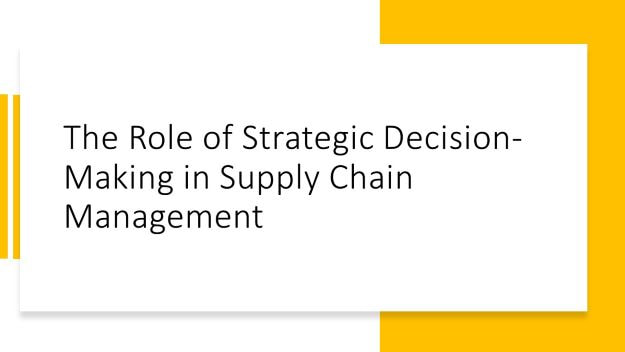Importance of rational decision-making in supply chain management
A key component of successful supply chain management is the ability to make rational decisions. While perfect economic rationality leads to the highest profit, it does not consider sustainability, reputation, or other factors. Many companies consider these factors in their decision-making process, and they often compromise between these three values to ensure that their supply chains are as efficient and cost-effective as possible. Despite these difficulties, it is important to note that supply chains can still be sustainable and ethical if managers use the right principles to guide them.
One of the key skills required to be an effective supply chain manager is the ability to make quick decisions. Quick decisions are often crucial in order to avoid costly interruptions. Moreover, supply chain management careers are dynamic and unpredictable, which makes quick decisions an essential trait. By making quick decisions, you will be able to effectively use staff and protect the goals of your organization. So, what are some other important skills required to be a successful supply chain leader?
A study results revealed that different factors affect decisionmaker's behavior in different ways. For example, the extent of bullwhip effect variation and the tendency of service level are different for different decisionmakers. (Tip: The Bullwhip effect refers to the phenomenon where order variability increases as the orders move upstream in the supply chain). The authors (of the study) also developed a system dynamics model of a supply chain that conforms to modern supply chain characteristics. They added two adjustment parameters and simulated the results. Based on the results, they concluded that behavioral adjustments with varying extents have different effects on supply chain performance.
Impact of rational decision-making on bottom line
Rationality is the ability to come to an informed decision. Rational decision-making models are logical and sequential and focus on listing various courses of action and evaluating the best one. They typically list all of the options, including their pros and cons, in order of importance. They begin by identifying a problem or opportunity, and then assess all options. Finally, they assign values to each option.
Applied to a supply chain management case study, researchers at the University of Lund applied a model of rational decision-making to the system. In this model, a problem is identified, a number of solutions are identified, and data is gathered to analyze the alternatives. The decisionmakers then choose the best solution and implement it. The process may also involve identifying trade-offs that affect the bottom line of supply chain management.
The downside of intuitive decision-making is that it's difficult to justify decisions after the fact. Because the decision-making process relies on accumulated knowledge, it is prone to cognitive biases. In contrast, systematic decision-making models use data analytics software and prescribed steps to arrive at optimal decisions. They can also help managers analyze multiple alternatives, which may reveal more than one advantage. So, how does rational decision-making affect the bottom line of supply chain management?
Impact of rational decision-making on asset utilization
Regulatory reforms and other disruptive events are often more detrimental than unforeseen ones. However, leaders can minimize the damage by minimizing the impacts of disruptive events by improving process flow and early identification. As a result, supply chains that have higher levels of operational slack have fewer disruptive events and greater flexibility. This may have a positive impact on a firm's ability to handle these events.
An article pool presents a thorough review of the advances in the field, and then provides managerial insights and ideas for further research. The authors also discuss the effects of supply chain disruptions and ripple effects, as well as analysis of current literature and comparisons. The article pool concludes with a list of research ideas that can be used to improve the effectiveness of supply chains. However, it is important to note that research on the topic of ripple effects is still in its early stages.
With mounting customer demands and the need for growth, supply chain leaders are tasked with optimizing the overall performance of the company's supply chain. However, while traditional goals such as working capital and profit margins remain important, a focus on revenue growth targets may be more effective. Initiatives aimed at cutting costs have had little success in structuring sustainable relationships. Thus, focusing on revenue growth is an important strategy for achieving profitable growth.
How fast a decision is made and how good is that decision determines how far the business will thrive. |
Related reading:
#operationalexcellence #strategy #strategicdecisionmaking #strategymanagement #decisiontools #decisionmaking #strategicplanning #challengesofdecisionmaking #supplychainmanagement





















